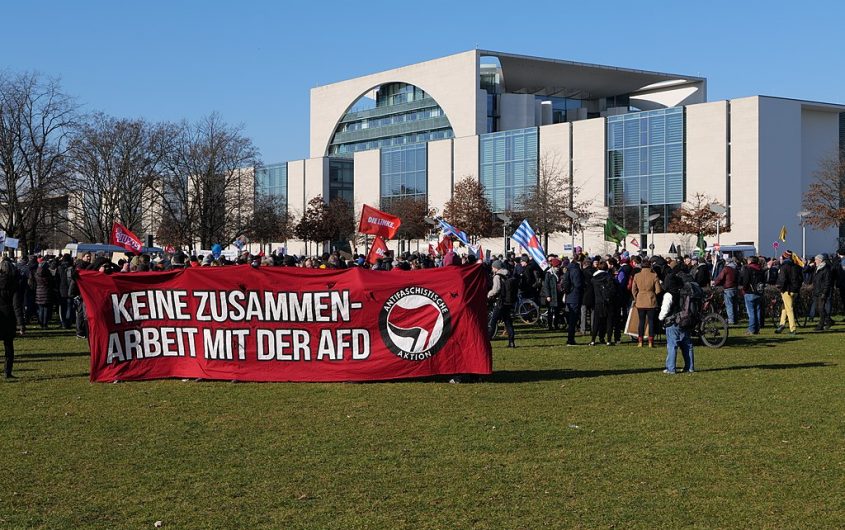
Leonhard Lenz via WIkimedia Commons
“Your Homeland is our Nightmare”: Viable Conservatism Amid Far-Right Terror

Caroline West
Research Intern
Caroline West is a research intern at AICGS for Spring 2020. She conducts research for staff and visiting fellows, writes media reports, manages the front desk, and helps organize and document events.
Caroline graduated from Johns Hopkins University in December 2019 with a Bachelor of Arts in International Studies and Sociology. While at Hopkins, her research concentrated on the impact of growing right-wing, anti-migrant movements on cultural and social integration initiatives in Germany. She is also interested in the obstacles to integration posed by ethnic and racial homogeneity, the persistence of the East-West divide in Germany, and how this divide is reflected in collective historical memory. She hopes to begin studying for a PhD in sociology in Fall 2021.
__

Vincent Doehr
Research Intern
Vincent Doehr is a research intern at AICGS for the spring of 2020. He assists fellows with research, manages the outreach database, operates the front desk, contributes to the AICGS website, and helps organize and document events.
Currently, Vincent is completing the fourth year of his undergraduate degree at Georgetown University’s Walsh School of Foreign Service. He studies International Politics with a concentration in international law, ethics, and institutions and a minor in German. He is currently writing a thesis investigating whether the European Union is a more effective actor than traditional nation-states in international negotiations due to its requirement of unanimity among the member states. His general research interests lie in the intersection of human rights and international institutions.
He has previously lived in Cologne and studied at the University of Trier and the Humboldt University of Berlin. He hopes to have a career in the field of international law.
__
In the weeks following political turmoil in eastern German state of Thuringia over unprecedented collaboration between mainstream German parties and the far-right Alternative for Germany (AfD) in supporting the Free Democratic Party (FDP) candidate for minister-president, a number of analyses have emerged to explain that collaboration’s implications for the future of German democracy. Some have developed an admittedly imperfect analogy between threats to contemporary German democracy and the waning of the Weimar Republic. Others have concentrated on the bureaucratic failure that the Thuringia elections revealed, characterizing the debacle there as stemming partially from a lack of effective coordination between Christian Democratic Union (CDU) federal party officials and leaders at the regional and state levels. More pointed analyses have questioned whether the coordination reveals a deeper lust for power that could weaken mainstream parties’ bulwark against collaboration with the far right. Others have concentrated on the ramifications of the Thuringia elections for German chancellor Angela Merkel’s succession plan, emphasizing that she now bears even greater responsibility for safeguarding the CDU’s future given that her chosen successor, Annegret Kramp-Karrenbauer, has resigned.
What does a viable conservative ideology in Germany look like moving forward, and can it emerge in the absence of robust discussion on German political parties’ failures to adequately address and denounce ethno-nationalism?
These perspectives are insightful and thorough, but they give less attention to the urgent questions that motivate this article: what does a viable conservative ideology in Germany look like moving forward, and can it emerge in the absence of robust discussion on German political parties’ failures to adequately address and denounce ethno-nationalism? Ethno-nationalism, after all, is a driving force for the AfD, which ran an ad during the 2017 Bundestag elections depicting a heavily pregnant white woman with the caption “New Germans? We’ll make them ourselves.” Amid fears that a far-right party is taking root in the German electorate, mainstream parties like the CDU and Free Democratic Party (market liberal) have struggled with balancing dual obligations to both prevent the rise of right-wing extremism and respect the results of free and fair elections. One senior CDU Bundestag member articulated this difficulty in a recent Financial Times article: “I cannot just disregard 25% of voters and say ‘I’m not going to talk to your representatives.’”
But understanding the full complexity of this challenge, and its implications for the future of German conservatism, requires moving beyond the dichotomous framework of the CDU’s aforementioned obligations. The difficulty faced by mainstream parties stems partially from their own failures to renounce ethno-nationalism and to address their hypocrisy in bowing to the far right while never bending to the far left, despite claims that they reject both political extremes. Such failures reflect a broader discomfort among Europeans and Germans to discuss identity in ethnic terms, even as they implicitly define “European-ness” or “German-ness” along ethnic lines.
The durability of this racialized conception of identity is demonstrated at the highest levels of European politics. The very naming of political offices, from the European Union’s Commissioner for Protecting Our European Way of Life to Germany’s Bundesministerium des Innern für Bau and Heimat (Federal Ministry of the Interior, Building, and Community) is a key example. Though the meaning of “Heimat” is contested and does not always imply racialized exclusivity, its usage here injects an element of defensive nationalism into how politicians and citizens conceptualize European identity, societal obligations toward promoting cultural diversity, and migrant flows into Europe. Even well-meaning individuals perpetuate this conception. German chancellor Angela Merkel spoke out in September 2019 against Fremdenfeindlichkeit (xenophobia), a term that encompasses hatred against both foreigners and German people of color, albeit implicitly. Merkel’s misstep here was not in condemning discrimination against both groups, but rather failing to problematize that these groups are so often lumped together. The same faltering is evident in the surge of pro-refugee integration initiatives created in the wake of the 2015 crisis, spurred on by Willkommenskultur, a “culture of welcome” that has emerged among liberals eager to atone for Germany’s past and establish new standards of acceptance and inclusion in German society. Though well meaning, these initiatives often fail to recognize the durable barrier posed by whiteness to full integration, relying, like Merkel, on the same tropes of inclusion that sometimes reinforce “otherness” rather than dismantling it.
These phenomena are evidence of an unspoken recognition of “German-ness” as defined by ethnicity, which influences how mainstream political parties interact with the far right. This was prominently demonstrated during the debate over whether Germany should implement a refugee cap. The CDU did not question whether there should be a refugee cap, but simply debated how low the limit should be set. The CDU conceded to the AfD that a refugee quota was valid policy, rather than vigorously pushing back on the idea that those fleeing for their lives should be turned away due to an arbitrary limit, which in turn reveals implicit acceptance of a core principle of the international immigration system: that states have a right to limit the flow of people across their sovereign borders, a designation which itself rests on the idea that there are clearly defined places and spaces in which some belong and others do not. This embedded principle of exclusion is not problematic in and of itself, but when delineated by ethnicity, becomes easy fodder for right-wing groups hailing the failures of multiculturalism and the promise of ethno-nationalism.
The CDU conceded to the AfD that a refugee quota was valid policy, rather than vigorously pushing back on the idea that those fleeing for their lives should be turned away due to an arbitrary limit.
In the aftermath of far-right terror attacks in Halle and Hanau, the German government has been remarkably candid about the endurance of racism and its potent impacts on German society. Chancellor Merkel has called it a “poison” that Germany must come to terms with. President Steinmeier exhorted a Zwickau audience to raise their voices against hate and violence. However, while the German political mainstream, particularly the center-right CDU, projects a strong front against extremism, this approach is not effective enough in the current political environment. The CDU operates according to a principle of equidistance from the far left and far right; the party refuses to form coalitions with either Die Linke or the AfD and regards both as threats to Germany’s democratic and constitutional structure. In practice, this equidistance is only an illusion, demonstrated by the recent state elections in Thuringia. The CDU was complicit in allowing an AfD-backed premier from the FDP to come to power, though he resigned a day later. In a recent interview, an influential member of the CDU announced that he had donated to the AfD at the height of the migrant crisis. At the same time, the CDU refuses to even entertain the idea of working with Die Linke, despite the elevation of moderate figures within the party, like Bodo Ramelow, who was re-elected minister-president in Thuringia earlier this month. This suggests that the party, even if its leadership remains publicly committed to the cordon sanitaire, may have more of an ideological affinity for the far-right than the far-left.
Some CDU politicians have begun to recognize the danger of equating Die Linke and the AfD, given the numeric limitation that this refusal to cooperate with either party places on the prospects of stable governance during a time when no single German party polls above 30 percent nationwide. Coming to terms with this limitation should be accompanied by acknowledgement of the darker implications of the party’s ideological concessions to the far right, which raise questions about its commitment to combating racism beyond tough pronouncements. The party must grapple with the extent to which the poison of racism, which manifests not only in deadly attacks and hateful manifestos, but also in subtler xenophobia and the association of German identity with whiteness, has infected its own political agenda.








